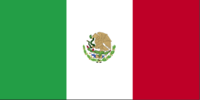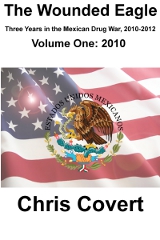US State Dept. Human Rights Report on Mexico Part I: The Politics

2011-04-10
Posted by: badanov
by Chris Covert
On Thursday April 7th a Mexican Army patrol in Guadaulupe, Nuevo Leon, a suburb of Monterrey intercepted a criminal group, freeing in the process a family of five.
The unit was conducting a routine patrol in the area when armed suspects aboard an SUV and a sedan fired weapons at the soldiers and then attempted to flee the area.
The driver of the Honda CRV SUV drove for a short distance before driving the vehicle into a ditch. The three suspects in the SUV managed to escape, while the three unidentified occupants in the Mitsubishi sedan surrendered.
A number of rifles were seized.
You can read the Spanish language version of the April 7th gun battle in Guadalupe, Nuevo Leon by clicking here.
As confrontations go, the April 7th battle was relatively tame by comparison.
The last confrontation in Guadalupe before the April 7th battle took place April 1st and claimed four lives of armed suspects, when a Mexican Army patrol fought a brief gun battle with armed suspects, who fired on them using AR-15 assault rifles.
To read the Rantburg report on the April 1st confrontation in Guadalupe, Nuevo Leon (last item), click here.
The United Nations likely timed the release of its report on Disappearances in Mexico last week with the US State Department report on human rights last Thursday.
Astonishingly, one of the recommendations out of more than 30 of the UN reports was to return the Mexican Army to the barracks, and to cease using it to fight drug crime in Mexico.
To read the Rantburg analysis of the UN report click here.
The introductory paragraph of the State Department's report noted problems with "...unlawful killings by security forces...kidnappings..." exist in Mexico, as reported through the Centro Nacional Derechos Humanos and through other means.
The Mexican press has been sensitive to the international criticism of the war on the drug cartels, as has been it main driver of the Mexican policy to use the army to fight the cartels, Mexican President Felipe Calderon Hinojosa.
Pressure to end the use of the army has been enormous given the means to deliver the criticism, including a Human Rights Watch report concerning recent events with the new Juarez police chief, the US state department report and the murder of the son of a Mexican writer.
Last week the son of Mexican poet Javier Sicily, Juan Francisco, and three other youths were murdered in a drug related incident in Temixco, Morelos.
Ordinarily even to local press the killing of a relative of a politician warrants some notice. For example, when the nephew of then Chihuahua governor-elect Cesar Duarte was shot to death in a botched kidnapping attempt in Chihuahua city late July, this write can recall three notices in La Polaka following the incident, not including the subsequent murder of the Sinaloa Chihuahua city commander Elizabeth Griego, said to be the group responsible for the shooting.
But in Mexican national press has appeared some reference to the Sicily murders every day for a week now.
In a severely critical letter posted online by the Mexican leftist weekly Proceso Sicily kept the pressure on Calderon. One of the statements in the letter deliberately blamed Calderon for the violence by calling the Mexican Drug War a "badly proposed, badly made, badly led war..."
To read the translated letter originally published in Proceso click here.
The publication of the letter was sufficient to get a private sit-down with Calderon Saturday morning in Mexico City lasting several hours. Despite the unusual meeting, and even with all the attendant publicity run up to it, Sicily left Los Pinos without making a statement.
The choice of outlets, Proceso was not happenstance. Proceso editors have been beating the drum for returning the army to the barracks for many months, profusely publishing remarks of such war critics as Partido Revolucion Democratica founder Andres Manuel Lopez Obrador, who lost the presidency to Calderon by less than one percentage point.
Lopez Obrador has been smart about his criticism about the war by couching it in terms of misdirected resources, but barely. The PRD is primarily an intellectual movement. Most of the groups an outsider would think would be a constituent group of the PRD, instead, nominally at least, belongs to the Partido Revolucionario Institucional, including campesinos, unionists and workers.
Lopez Obrador and the PRD have clearly needed help in driving home their message about returning the army to the barracks. And it appears that the United Nations and the US state Department have obliged them.
| How kind of the State Department to be so helpful. |
Despite the criticism published, the State Department reports focuses on five separate incidents that took place in 2010 involving Mexican security forces, of which three can be classified as deliberate shootings by the Mexican Army.
The conclusion in Monday's Rantburg.



